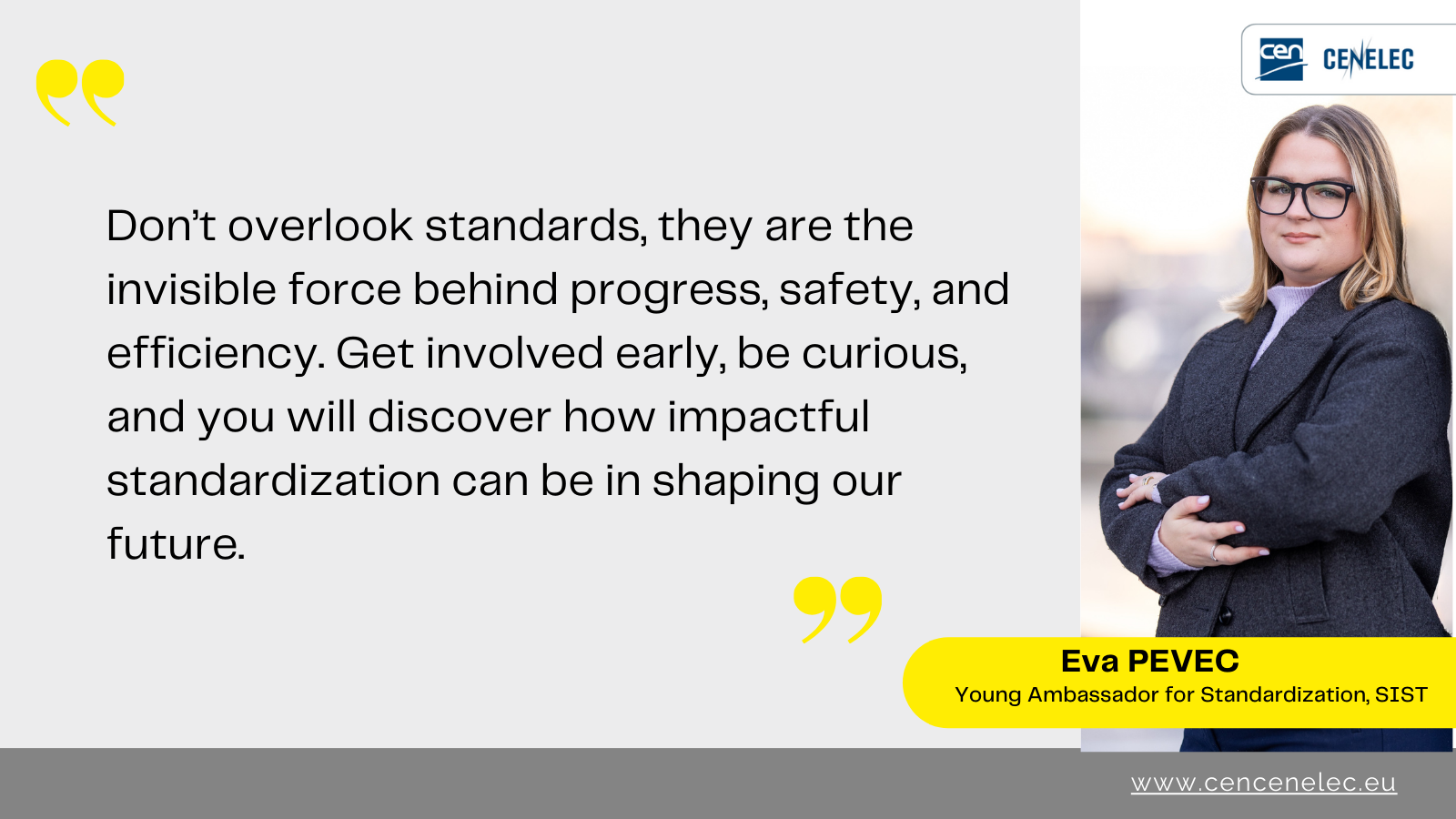Young professionals bring new energy, ideas, and skills to European standardization. As our society undergoes rapid transformations, their contributions are key to ensuring that standards remain relevant, forward-looking, and impactful.
In the context of the green and digital transitions, and as Europe strengthens its efforts to build a skilled and forward-looking workforce, we are continuing our interview series dedicated to young professionals. Through conversations with young professionals working in standardization across different sectors and countries, we will highlight their experiences, motivations, and visions for the future.
This campaign aims to shed light on the vital role of skills, collaboration, and innovation in keeping European standardization fit for tomorrow’s challenges – and on the people who are already helping to shape it.
For the third episode in this year’s series of interviews, we interviewed Eva Pevec, one of SIST's Young Ambassadors for Standardization, on how she learned about the value of standards, her experience as a Young Ambassador for Standardization, and why young people should not overlook standards.
1. Please, present yourself. How are you involved in standardization?
My name is Eva Pevec, and I am a master’s student of Management at the School of Economics and Business in Slovenia. I am currently one of the Young Ambassadors for Standardization at SIST, the Slovenian Institute for Standardization. As part of the programme, I have had the opportunity to explore how standards shape industries and to promote awareness of standardization among my peers.
2. How did you become interested in standardization?
My interest in standardization developed during my studies in management, where I encountered the importance of quality control, interoperability, and sustainability in business operations. When I learned about the Young Ambassadors programme, I realized how crucial standards are not only in technical fields but also in creating fair and efficient markets.
3. At SIST, you are part of the "Young Ambassadors for Standardization" programme. Can you briefly explain why you wanted to join? What has been your experience?
I joined the programme because I saw it as a unique opportunity to better understand how international and European standards influence real-world business practices. My experience has been incredibly enriching. I have participated in multiple conferences and career days, visits to Slovenian companies like 360 Karting and ETI, engaged with professionals working directly with standardization processes, and collaborated with other young ambassadors to raise awareness of standardization’s importance across different sectors.
4. Do you think standardization provides some added value for your career development?
Absolutely. Standardization knowledge provides a competitive edge in any career, especially in fields like management, logistics, sustainability or quality assurance. It shows employers that you understand global frameworks, risk management, and regulatory compliance, skills that are essential in today’s interconnected and highly regulated markets.
5. Why should there be more young people in standardization? What advice would you like to tell your fellow young professionals to invite them into the world of standardization?
Young people bring fresh perspectives, digital skills, and innovative ideas to the table. Standardization needs this energy to remain relevant in our rapidly changing world. I would tell my peers: don’t overlook standards, they are the invisible force behind progress, safety, and efficiency. Get involved early, be curious, and you will discover how impactful standardization can be in shaping our future.
6. Do you think standardization has a role to play in addressing big challenges, such as the digital transition or climate change?
Yes, standardization is essential to tackling major global challenges. In the digital transition, standards ensure cybersecurity, interoperability, and ethical AI development. In the fight against climate change, environmental standards drive sustainable production, carbon reduction, and circular economy principles. Without harmonized standards, it would be much harder to scale up solutions globally.
This article is part of our special series dedicated to the Young Professionals in European Standardization: through a series of articles and interviews with standardization professionals, experts and business leaders coming from a variety of backgrounds, we will explore the interaction between innovation, skills and standardization in some of the most relevant sectors for Europe’s long-term competitiveness. You can read the other articles related to the campaign here.




